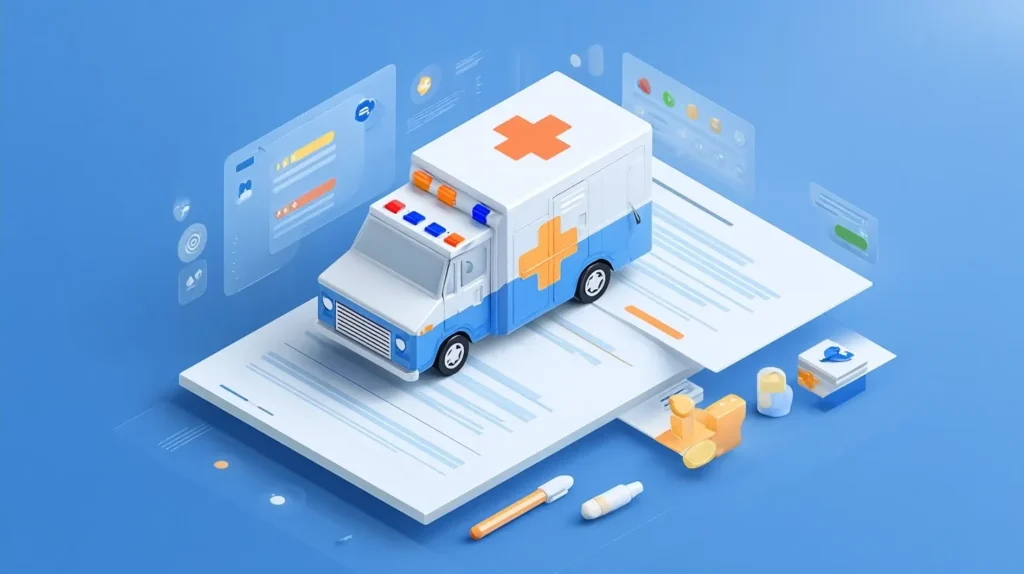In recent months, public health officials in Illinois have raised alarms regarding significant gaps in healthcare coverage, notably in ambulance services. As the state grapples with rising costs linked to ambulance services alongside cuts to crucial Medicaid reimbursements, the implications are dire for communities across Illinois. This blog post will delve into the core challenges affecting the healthcare system, particularly in ambulance services, while highlighting actionable steps healthcare professionals, policymakers, and public health officials can take to address these critical issues.
Understanding the Current Healthcare Landscape
The healthcare environment in Illinois is evolving, but not always positively. The rising costs of providing emergency transportation services have increasingly strained resources. Simultaneously, cuts to Medicaid reimbursement threaten the viability of essential services such as ambulance transport, which many residents rely on for timely and life-saving interventions. According to recent studies, nearly 80% of ambulance services operate at a loss, struggling to balance operational costs with inadequate reimbursement rates. Therefore, understanding these challenges is vital for anyone involved in healthcare management and policy.
Key Challenges in the Illinois Ambulance Sector
1. Rising Ambulance Costs
Ambulance service providers in Illinois face escalating operational costs due to various factors, including workforce shortages, maintenance of aging equipment, and rising fuel prices. For example, data from the Federal Bureau of Labor Statistics demonstrates that the cost of operating an ambulance has increased by over 15% in the past five years alone. These rising costs exacerbate the existing financial challenges faced by service providers, forcing many to reconsider the sustainability of their operation.
2. Cuts to Medicaid Reimbursements
In an attempt to manage budget deficits, Illinois has implemented cuts to Medicaid reimbursements, significantly affecting providers reliant on these funds. Many ambulances obtain a substantial portion of their income from Medicaid, and these cuts lead to financial instability. A recent report noted that providers have seen reimbursement rates drop by as much as 20%, prompting discussions about the long-term viability of these services. As a result, providers may be forced to reduce services or, in some cases, cease operations altogether.
The Impacts on Public Health and Community Well-being
The convergence of rising costs and reimbursement cuts poses serious risks to public health in Illinois. Communities are likely to face delays in emergency response times, which can lead to adverse health outcomes. For instance, in rural areas where ambulance services are already stretched thin, the potential for loss of life due to delayed responses is a chilling reality.
Additionally, the public health ramifications of inadequate ambulance services can lead to increased emergency room congestion, exacerbating the existing struggles of hospitals and healthcare providers to deliver timely care. Studies show that timely access to emergency services can reduce mortality rates by as much as 25% in critical situations. Therefore, disruptions in these services can have wide-reaching implications.
The Role of Healthcare Professionals and Policymakers
In light of these challenges, the involvement of healthcare professionals and policymakers is crucial in advocating for better healthcare funding. By addressing systems of reimbursement and advocating for increased funding, they can play a vital role in averting a public health disaster. Here are actionable insights to consider:
- Advocate for Policy Changes: Engaging with local and state legislators on the importance of maintaining and increasing funding for essential services can lead to meaningful changes in funding structures.
- Stay Informed on Funding Opportunities: Professionals should actively seek out grants and other funding opportunities that can bolster ambulance services and mitigate financial strains.
- Collaborate with Other Healthcare Providers: Working in unison with hospitals and public health organizations can amplify voices calling for necessary changes and highlight the interconnectedness of healthcare services.
- Educate the Public: Communication is key; informing communities about the challenges facing ambulance services can cultivate public support and lobbying efforts for healthcare funding.
Innovations in Healthcare and Ambulance Services
Despite challenges, the ambulance services sector is also witnessing innovative solutions that can help alleviate some of these burdens. For instance, telemedicine integration within ambulance services has opened new avenues for patient care, allowing paramedics to consult with physicians in real-time. This approach can expedite care delivery and ensure that patients receive treatment before they even reach the hospital.
Moreover, technological advancements in healthcare are affecting logistics and operational management. For instance, predictive analytics can aid ambulance dispatch by evaluating traffic patterns, historical call data, and response times. Implementing such technologies not only improves operational efficiency but can also save critical minutes during emergencies, ultimately enhancing patient outcomes.
The Importance of Funding for Public Health Initiatives
Ultimately, the importance of adequate funding cannot be overstated. As Illinois faces an uphill battle with healthcare funding and management, fostering strong advocacy for public health initiatives will be crucial for driving systemic change. Without comprehensive support from state funding and policy changes, the challenges of rising ambulance costs and Medicaid cuts will persist, amplifying existing disparities within the healthcare system.
Public agencies, healthcare professionals, and nonprofit organizations must unite to raise awareness and advocate for sustainable funding models that prioritize essential health services, particularly in emergency medical services.
Conclusion
The healthcare funding crisis affecting ambulance services in Illinois reflects broader challenges that impact public health outcomes. Rising costs and decreased Medicaid reimbursements signal the need for immediate and coordinated action among healthcare stakeholders. By advocating for better funding and engaging in collaborative efforts, healthcare professionals and policymakers can ensure that communities receive the vital emergency services they need.
As industry leaders at Pulivarthi Group, we recognize the significance of staffing solutions in navigating these challenges. Our expertise in providing tailored staffing and resource solutions can enhance operational efficiency in healthcare services, ensuring that ambulance providers maintain their operational viability amid these fiscal pressures. Hospitals and ambulance services must prioritize strategic workforce planning to address staffing shortages, which, if left unchecked, will further impair service delivery.
It’s time to advocate for better healthcare funding, ensuring that all communities, especially those most vulnerable, have access to the emergency services they critically need. Together, we can work towards a more sustainable healthcare system that prioritizes public health over profit.






